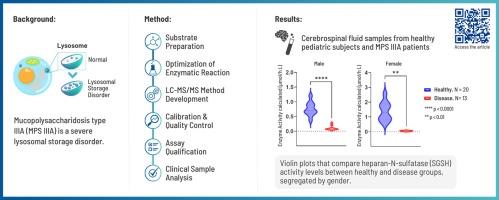Tandem mass spectrometry-based assay for heparan-N-sulphatase in paediatric CSF: A potential pharmacodynamic biomarker for mucopolysaccharidosis type IIIA therapy
IF 3.2
3区 医学
Q2 MEDICAL LABORATORY TECHNOLOGY
引用次数: 0
Abstract
Mucopolysaccharidosis type IIIA is a lysosomal storage disorder caused by mutations in the gene coding for heparan-N-sulphatase, a crucial enzyme in the degradation of heparan sulfate. In mucopolysaccharidosis type IIIA, heparan sulfate accumulates in the lysosomes, predominantly affecting the central nervous system. It is the most common and most severe form of mucopolysaccharidosis type III, with onset typically before the age of ten years. There is an ongoing effort to develop therapies that aim at restoring enzyme function in the brain. This study introduces a novel tandem mass spectrometry method for assessing heparan-N-sulphatase activity in pediatric cerebrospinal fluid from healthy and disease individuals.
Analysis of cerebrospinal fluid samples revealed marked differences in enzyme activity, with mucopolysaccharidosis type IIIA individuals exhibiting significantly reduced levels. This new method could serve as a valuable tool for evaluating the efficacy of future therapeutic interventions targeting sulphatase activity restoration in the brain.

基于串联质谱法的儿科脑脊液中肝素-N-硫酸酯酶测定:治疗黏多醣症IIIA型的潜在药效学生物标记物。
IIIA 型粘多糖病是一种溶酶体贮积症,由肝素-N-硫酸酯酶的编码基因突变引起,而肝素-N-硫酸酯酶是降解硫酸肝素的一种关键酶。在粘多糖病 IIIA 型中,硫酸肝酯在溶酶体中蓄积,主要影响中枢神经系统。它是粘多糖病 III 型中最常见、最严重的一种,通常在 10 岁前发病。目前,人们正在努力开发旨在恢复脑内酶功能的疗法。本研究介绍了一种新型串联质谱方法,用于评估健康人和患病者小儿脑脊液中肝素-N-硫酸酯酶的活性。对脑脊液样本的分析表明,酶活性存在明显差异,粘多糖病 IIIA 型患者的酶活性明显降低。这种新方法可作为一种有价值的工具,用于评估未来以恢复脑内硫酸酯酶活性为目标的治疗干预措施的疗效。
本文章由计算机程序翻译,如有差异,请以英文原文为准。
求助全文
约1分钟内获得全文
求助全文
来源期刊

Clinica Chimica Acta
医学-医学实验技术
CiteScore
10.10
自引率
2.00%
发文量
1268
审稿时长
23 days
期刊介绍:
The Official Journal of the International Federation of Clinical Chemistry and Laboratory Medicine (IFCC)
Clinica Chimica Acta is a high-quality journal which publishes original Research Communications in the field of clinical chemistry and laboratory medicine, defined as the diagnostic application of chemistry, biochemistry, immunochemistry, biochemical aspects of hematology, toxicology, and molecular biology to the study of human disease in body fluids and cells.
The objective of the journal is to publish novel information leading to a better understanding of biological mechanisms of human diseases, their prevention, diagnosis, and patient management. Reports of an applied clinical character are also welcome. Papers concerned with normal metabolic processes or with constituents of normal cells or body fluids, such as reports of experimental or clinical studies in animals, are only considered when they are clearly and directly relevant to human disease. Evaluation of commercial products have a low priority for publication, unless they are novel or represent a technological breakthrough. Studies dealing with effects of drugs and natural products and studies dealing with the redox status in various diseases are not within the journal''s scope. Development and evaluation of novel analytical methodologies where applicable to diagnostic clinical chemistry and laboratory medicine, including point-of-care testing, and topics on laboratory management and informatics will also be considered. Studies focused on emerging diagnostic technologies and (big) data analysis procedures including digitalization, mobile Health, and artificial Intelligence applied to Laboratory Medicine are also of interest.
 求助内容:
求助内容: 应助结果提醒方式:
应助结果提醒方式:


